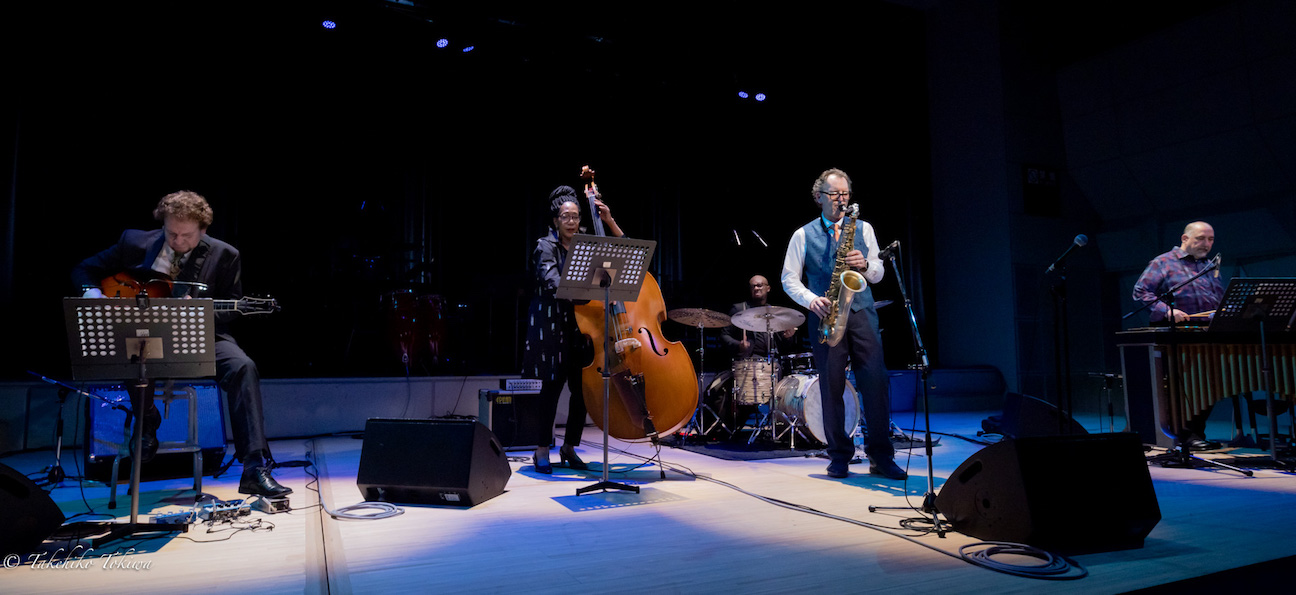
For nearly three decades, Chris Collins’ musicianship has led him around the world. From Italy and Japan to South Africa and Scotland, Collins has seen it all. But early on, he realized the intrinsic value of engaging these cultures through music and language.
“It helped me better understand some of the cultural realities of communication and the arts,” said Collins, Valade Endowed Chair in Jazz, professor and director of jazz studies at Wayne State University. “In my case, it was about experiencing the jazz and cultural influences in different countries to find out what their artistic priorities are. These experiences continue to enlighten me. Over the years, I was able to develop my own perspective on the world — politics and everything else — based on firsthand experiences and how I engage with individuals.”
Collins has performed at jazz festivals around the globe, released albums, been credited on film soundtracks and won numerous awards — including the Brusoni Award in Italy, which he was the first American to receive. It would have been easy to continue being a professional musician first, with a teaching gig to fall back on.
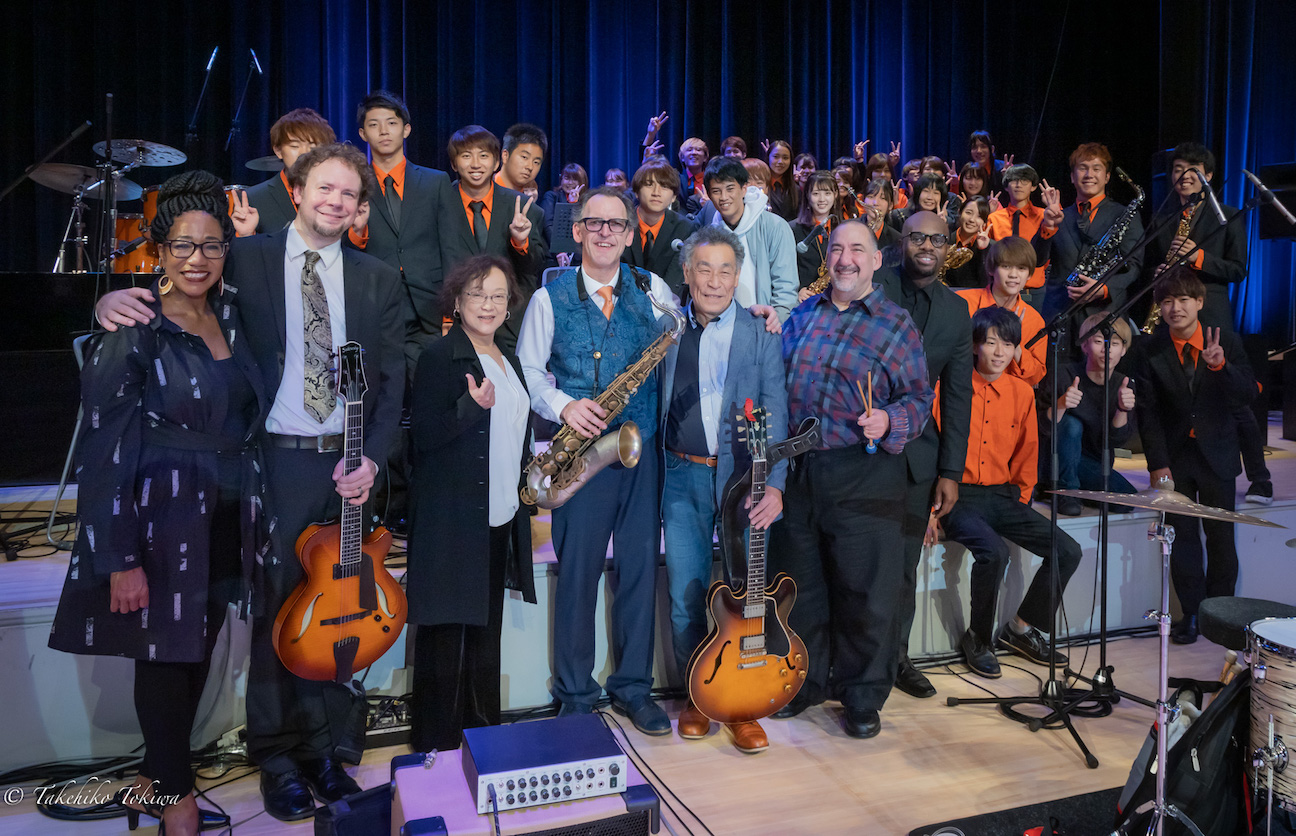 “But when I got to the point at Wayne State where I received tenure, I realized there was great value to our students and to the university to find ways to leverage those professional opportunities and experiences I had and turn them into unique, memorable moments and learning opportunities for our students,” he said.
“But when I got to the point at Wayne State where I received tenure, I realized there was great value to our students and to the university to find ways to leverage those professional opportunities and experiences I had and turn them into unique, memorable moments and learning opportunities for our students,” he said.
Helping Collins make those opportunities a reality is Gretchen Valade. As founder and chair of Harper Woods-based jazz record label Mack Avenue Records, owner of the Dirty Dog Jazz Café, and heir to the Carhartt apparel company, Valade founded the Detroit International Jazz Festival Foundation in 2006, subsequently renamed the Detroit Jazz Festival, and took over the fest’s production and management.
In 2011, Collins was offered the job of artistic directorship of the largest free jazz festival in the country. He launched many initiatives, such as jam sessions, competitions for young musicians, programs in local schools and a jazz festival alumni band. Four years later, Valade and the board took another big leap, Collins joked, and asked if he would serve as the foundation’s president. He was hesitant at first, but soon realized he had much to offer.
“I came to understand it sent a message that the Detroit Jazz Festival Foundation — unlike most other foundations of its sort — is being led by artists. The artists are our primary goal,” Collins said. “As I got into the position, I started to implement some things to understand where we might have voids in what we’re doing.”
“We are them. They are us.”
One of those voids showed itself after Collins conducted a cultural survey on the Detroit Jazz Festival. To his dismay, he found that one of the lowest numbers of participation was self-identified Latino patrons.
He was perplexed. After all, Collins said, jazz and American music are based on traditional African rhythms, concepts of communication, call and response interaction, and community participation. Through diaspora and slavery, traditional African music came out of the continent. But America wasn’t the first stop. Before it reached American shores, where it was allowed to flourish, particularly during slavery, the music was in many of the Spanish-speaking countries — Puerto Rico, Panama and Cuba.
“These were places where a lot of African music was distilled and then brought up into cities such as New Orleans,” Collins said. “The music — and the musicians from those countries — became some of the cornerstones of what evolved into American jazz and American culture. This is really important in today’s world, where people think in terms of prejudice and separation — us versus them. We are them. They are us. They are the rock ‘n’ roll, jazz, and folk music we’re talking about. A lot of it is because of those countries.”
Travel, language, communication and a “feeling that they’re not invited to the party” were all barriers to participation, Collins found. He embarked on a personal mission with the Detroit Jazz Festival Foundation to collaborate and create initiatives that engaged Latino artists and patrons. He began locally in southwest Detroit, working with various organizations — including the Ford Resource and Engagement Center — to reach out to the community. Collins found that transportation was a barrier that prevented people from coming to the event, so the foundation worked with Ford and others to remedy it. 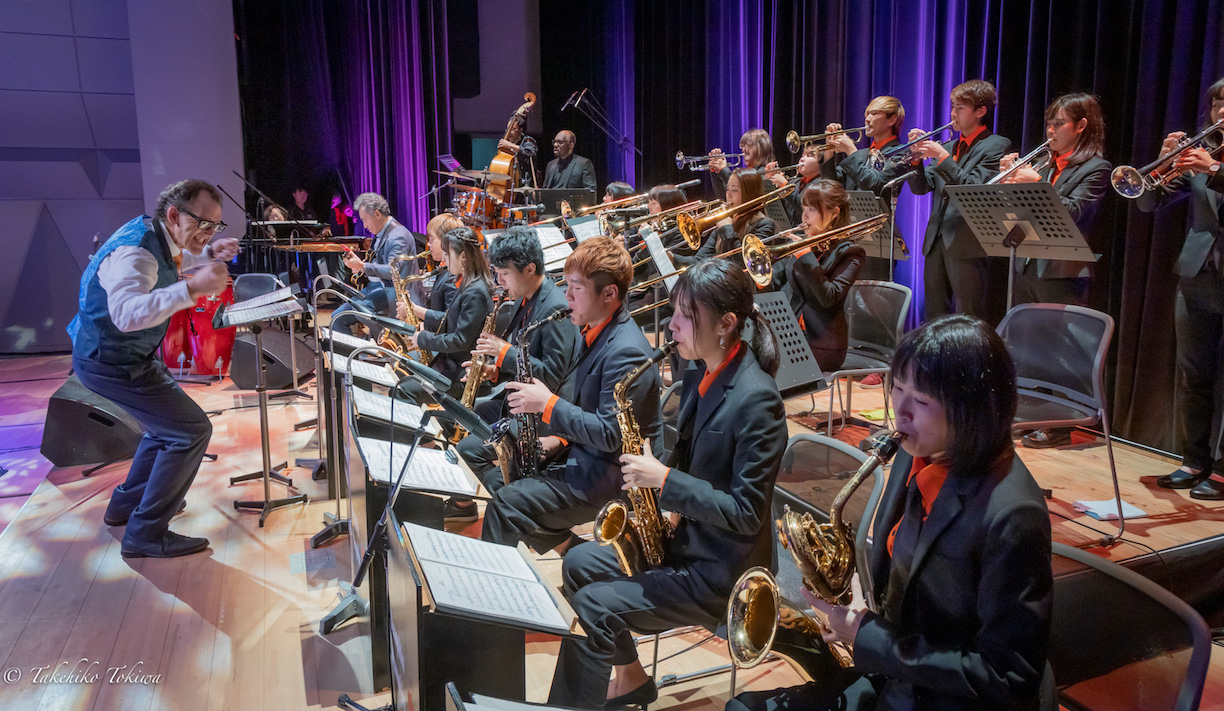
“We also started to do concerts on their series and with their artists,” Collins said. “We translated all the Jazz Festival Foundation materials into Spanish for patrons and invited artists, so the announcements welcomed everyone. We then started to extend the international programs.”
In 2016, the foundation expanded its international outreach with performances and workshops at the world-renowned Panama Jazz Festival. Drummer Nate Winn, a former student of Collins’ and current member of the Detroit Jazz Festival All-Stars band, performed during that first trip. Winn was one of 10 Wayne State students who played as part of the Pan-American Detroit Big Band in front of 15,000 jazz fans from around the world.
After sharing that stage in Panama with Grammy-winning artist Danilo Perez, Winn was personally invited by Perez, the artistic director at the elite Berklee College of Music’s Global Jazz Institute, to apply for graduate school. Only 20 musicians are accepted per year.
“After that concert, Danilo looked at me and said, ‘Nate, you need to come to Boston.’ Being a fan, I couldn’t believe it,” said Winn, who graduated from Berklee in 2019 with a master’s in jazz performance. “But these are the types of experiences and opportunities that Chris and these programs are able to provide.”
As of January 2020, Winn, Collins and other Detroit artists continue to play the festival and engage Panamanian musicians in workshops that focus on individual instruments. Collins also recently appeared as a guest at the Havana Jazz Festival in Cuba, planning for an upcoming collaboration and yearlong engagement that will culminate at the 42nd annual Detroit Jazz Festival, which will be held Sept. 3-6, 2021, in Detroit. (UPDATE: The Detroit Jazz Festival recently announced that the celebration will be held virtually this year because of the coronavirus outbreak.)
“The visionary that Chris is, he wanted to make the work we were doing global. So they started the collaboration in Panama and then Japan,” Winn said. “Chris is constantly making moves. I admire his work ethic and his desire to really put Detroit on the map. It’s been an ongoing thing, and it continues to skyrocket.”
In the Eastern hemisphere, Collins, Winn and the Jazz Festival All-Stars have served as ambassadors of Detroit culture for the last four years, performing in Japan at the Tottori Jazz Festival, the Yokohama Jazz Festival and other jazz clubs around Tokyo. They also hold all-day workshops at Japanese universities, where they share with and learn from their Japanese jazz counterparts on a personal level.
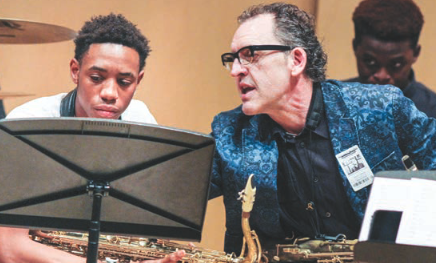 “Not only do we get to perform in front of hundreds and thousands of people who appreciate this music, but we get fulfillment from these workshops,” Winn said. “This last Japan trip in Tottori, we had people starving for knowledge, which I think we take for granted here. The educational side of what we do is just as important. We get to collaborate with young musicians, older musicians — anyone who’s willing to learn and wants to get better. We’re making ourselves available to them, and it’s an amazing thing to be part of someone’s growth.”
“Not only do we get to perform in front of hundreds and thousands of people who appreciate this music, but we get fulfillment from these workshops,” Winn said. “This last Japan trip in Tottori, we had people starving for knowledge, which I think we take for granted here. The educational side of what we do is just as important. We get to collaborate with young musicians, older musicians — anyone who’s willing to learn and wants to get better. We’re making ourselves available to them, and it’s an amazing thing to be part of someone’s growth.”
For Collins, it’s exactly what he envisioned.
“There’s this two-way street in how we engage with each other. We do a lot of social media, too, so the world sees this unfolding and the beauty of what’s happening,” Collins said. “The end result is not just a one-time hit. It’s to create long-term relationships with these countries and communities and offer them opportunities here in the states — in Detroit — to be part of our world and share with us what they’re all about.”
Eliminating barriers
For anyone who wants to see an example of diversity and inclusion in action a bit closer to home, Collins encourages them to stick their heads into a summer jazz week class at Wayne State. Started in 2007, Collins and WSU’s Department of Music embarked on a long-term partnership with the Detroit Jazz Festival with Jazz Week@Wayne — a one-week workshop that provides 40 high school students with an intensive and rewarding jazz education.
In 2012, the program’s name was changed to J.C. Heard JazzWeek@Wayne in honor of jazz drummer extraordinaire J.C. Heard and the generous support from the Heard family. The program nurtures students with a time-tested curriculum that blends formal academic discipline with the historic models of the Street School. But students can’t pay to play. Instead, they’re chosen through competitive audition. There’s no burdensome tuition fee, Collins said, which allows the program to bring together a diverse collection of talented youth from urban, rural and suburban settings. “We try to eliminate a lot of the dividing lines,” Collins said. “It’s free, and lunches are provided.”
The program is at capacity every year, with a significant number of returning students. The positive impact of the J.C. Heard JazzWeek@Wayne collaboration is evidenced by its high success rate and scholarship offers to participants who choose to continue their jazz education at the university level.
Guided by Wayne State jazz faculty, guest artists from the Detroit community and national artist/educators sponsored by the Jazz Festival, students study improvisation, theory and ensemble playing. They also work in master class settings, jam sessions, and small and large ensemble rehearsals, culminating with two public performances. 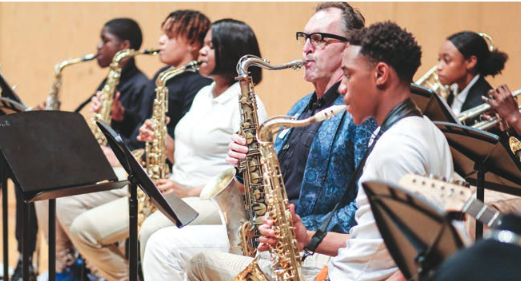
Jazz guitarist Chuck Newsome has been part of J.C. Heard Jazz Week@Wayne since its second year, taking over in 2020 as the program’s educational director. His musical connection to the university runs deep; Newsome earned a bachelor’s in jazz studies and a master’s in jazz performance from Wayne State. Soon after graduation, he became a faculty member in the Department of Music and, in 2016, was named coordinator of the university’s jazz guitar program.
“I’ve always seen teaching as a two-way street. As a teacher, I get a lot out of it,” Newsome said. “For me, working with younger people who have optimism, energy and new ideas and revisiting the fundamentals of music — those are some of the reasons I got into music in the first place.”
In addition to cost, Collins and Newsome recognized another barrier for students — reliable transportation. If the students can’t come to the audition, they bring the audition to them. In his capacity as the Detroit Jazz Festival Foundation’s education coordinator, Newsome and several teachers — who are all world-renowned Detroit jazz musicians — work with Detroit Public Schools students at Martin Luther King Jr. Senior High School, Detroit School of the Arts, Cass Technical High School, Renaissance High School, Duke Ellington Conservatory and Bates Academy. “We go to the schools and do the auditions right there in the class,” Newsome said. “If any student has an interest, all they have to do is raise their hand and tell their teacher. They don’t have to go anywhere. We found that it’s been pretty successful.”
Collins, Newsome and the rest of the Wayne State jazz program will have a new space in the coming years that will provide greater flexibility to expand their community outreach. With a total $9.5 million commitment from Valade, the Gretchen Valade Jazz Center will renovate the Hilberry Theatre into a world-class jazz performance venue. The center will host an array of high-profile concerts and serve as an educational hub for Wayne State’s jazz students and faculty.
In addition, the center will feature a secondary jazz performance area. The Jazz Underground will feature jam sessions, jazz workshops, community engagement programs and a venue for jazz on film. The adjacent lobby will be named the Detroit Jazz Festival Café, where patrons can enjoy refreshments amid Detroit Jazz Festival memorabilia.
Collins sees the center as the next step to what he’s always been passionate about — removing as many barriers as possible for everyone. When diversity and inclusion happen, “we are all that much better for it and it reflects what Wayne State has always embraced,” he said.
“All of these initiatives have the power to break down barriers,” Collins said. “In this day and age, it’s easy to become jaded or even prejudiced toward people based on assumptions. Art and music can be the bridges that connect people, even in the face of political differences. There’s an overarching message here that goes beyond music — we are all one and share many more commonalities than differences.”
This story originally appeared in the Winter 2020 issue of Warriors magazine.
